21世纪大学实用英语综合教育教案第二册Unit1
- 格式:doc
- 大小:119.19 KB
- 文档页数:30
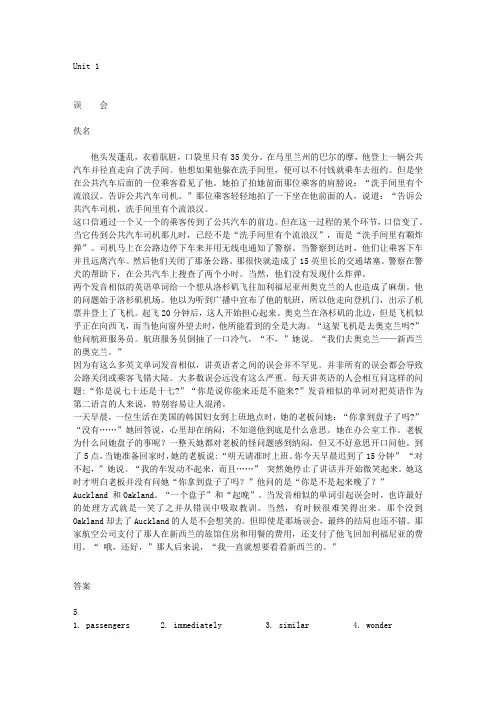
Unit 1误会佚名他头发蓬乱,衣着肮脏,口袋里只有35美分。
在马里兰州的巴尔的摩,他登上一辆公共汽车并径直走向了洗手间。
他想如果他躲在洗手间里,便可以不付钱就乘车去纽约。
但是坐在公共汽车后面的一位乘客看见了他。
她拍了拍她前面那位乘客的肩膀说:“洗手间里有个流浪汉。
告诉公共汽车司机。
”那位乘客轻轻地拍了一下坐在他前面的人,说道:“告诉公共汽车司机,洗手间里有个流浪汉。
这口信通过一个又一个的乘客传到了公共汽车的前边。
但在这一过程的某个环节,口信变了。
当它传到公共汽车司机那儿时,已经不是“洗手间里有个流浪汉”,而是“洗手间里有颗炸弹”。
司机马上在公路边停下车来并用无线电通知了警察。
当警察到达时,他们让乘客下车并且远离汽车。
然后他们关闭了那条公路。
那很快就造成了15英里长的交通堵塞。
警察在警犬的帮助下,在公共汽车上搜查了两个小时。
当然,他们没有发现什么炸弹。
两个发音相似的英语单词给一个想从洛杉矶飞往加利福尼亚州奥克兰的人也造成了麻烦。
他的问题始于洛杉矶机场。
他以为听到广播中宣布了他的航班,所以他走向登机门,出示了机票并登上了飞机。
起飞20分钟后,这人开始担心起来。
奥克兰在洛杉矶的北边,但是飞机似乎正在向西飞,而当他向窗外望去时,他所能看到的全是大海。
“这架飞机是去奥克兰吗?”他问航班服务员。
航班服务员倒抽了一口冷气,“不,”她说。
“我们去奥克兰——新西兰的奥克兰。
”因为有这么多英文单词发音相似,讲英语者之间的误会并不罕见。
并非所有的误会都会导致公路关闭或乘客飞错大陆。
大多数误会远没有这么严重。
每天讲英语的人会相互问这样的问题:“你是说七十还是十七?”“你是说你能来还是不能来?”发音相似的单词对把英语作为第二语言的人来说,特别容易让人混淆。
一天早晨,一位生活在美国的韩国妇女到上班地点时,她的老板问她:“你拿到盘子了吗?” “没有……”她回答说,心里却在纳闷,不知道他到底是什么意思。
她在办公室工作。
老板为什么问她盘子的事呢?一整天她都对老板的怪问题感到纳闷,但又不好意思开口问他。
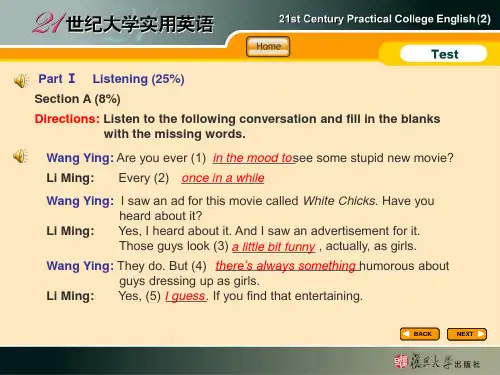
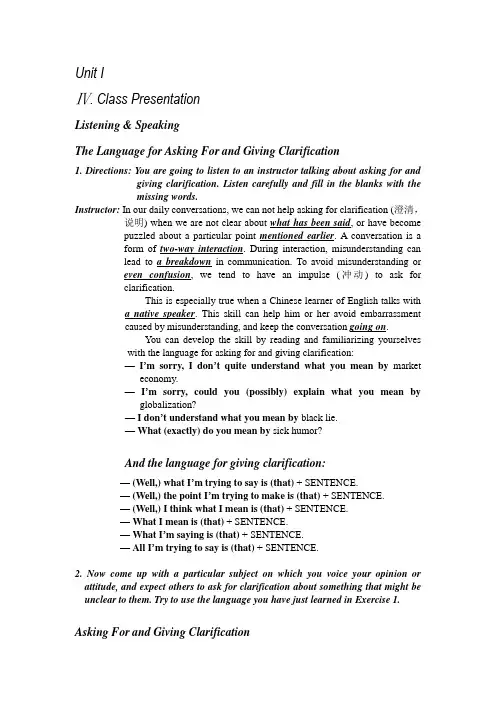
Unit IⅣ. Class PresentationListening & SpeakingThe Language for Asking For and Giving Clarification1. Directions: You are going to listen to an instructor talking about asking for andgiving clarification. Listen carefully and fill in the blanks with themissing words.Instructor: In our daily conversations, we can not help asking for clarification (澄清,说明) when we are not clear about what has been said, or have becomepuzzled about a particular point mentioned earlier. A conversation is aform of two-way interaction. During interaction, misunderstanding canlead to a breakdown in communication. To avoid misunderstanding oreven confusion, we tend to have an impulse (冲动) to ask forclarification.This is especially true when a Chinese learner of English talks witha native speaker. This skill can help him or her avoid embarrassmentcaused by misunderstanding, and keep the conversation going on.You can develop the skill by reading and familiarizing yourselves with the language for asking for and giving clarification:—I’m sorry, I don’t quite understand what you mean by market economy.—I’m sorry, could you (possibly) explain what you mean by globalization?—I don’t understand what you mean by black lie.—What (exactly) do you mean by sick humor?And the language for giving clarification:—(Well,) what I’m trying to say is (that) + SENTENCE.—(Well,) the point I’m trying to make is (that) + SENTENCE.—(Well,) I think what I mean is (that) + SENTENCE.—What I mean is (that) + SENTENCE.—What I’m saying is (that) + SENTENCE.—All I’m trying to say is (that) + SENTENCE.2. Now come up with a particular subject on which you voice your opinion or attitude, and expect others to ask for clarification about something that might be unclear to them. Try to use the language you have just learned in Exercise 1. Asking For and Giving Clarification1) Directions: Before you listen to the first conversation, read the following wordsand expressions which may be new to you.available 有空的innocent 无害的fib 小谎Listen to the following conversation twice and fill in the blanks with the missing words.Wang Ying: Are you going to the party tonight, Tom? They told me it was going to be fun.Tom Chang: I know, but I don’t think I’m available tonight. Are you?Wang Ying: Well…it depends.Tom Chang: I’ll tell them a little white lie.Wang Ying: Tell them what? What’s that?Tom Chang: I said: “I will tell them a little white lie.”Wang Ying: I don’t understand what you mean by white lie.Tom Chang: Oh, it is an innocent social fib or excuse.Wang Ying: Oh, I’ve got it now!Tom Chang: Sometimes we have to do it in our daily lives.Wang Ying: So what’s your little white lie?Tom Chang: Well, what would you say?Now listen to the conversation and answer the following questions1. Who won’t be able to attend the party tonight?Tom Chang.2. Is Wang Ying going to the party?It depends.3. What will Tom Chang tell them?He’ll tell them a little white lie.4. What is a white lie according to Rom Chang?It’s an innocent social fib or excuse.35. What’s their little white lie?Not mentioned.2) Directions: Before you listen to the second conversation, read the following wordwhich may be new to you.hearing problems 听觉疾病hearing aid 助听器device 装置will 遗嘱Listen to the following conversation twice, and then complete the passage according to the conversation you have just heard.There was an elderly gentleman who had had serious hearing problems for years. He went to the doctor who was able to have him fitted for a set of hearing aids that allowed the man to hear 100%.The old fellow went back in a month to the doctor and the doctor said, “Your hearing is perfect. Your family must be really pleased that you can hear again.”To this the gentleman replied, “Oh, I haven’t told my family yet. I just sit around and listen to conversations. I’ve changed my will three times!”Now listen to the conversation again, and complete the form as the speaker recounts it. After that, act it out in class.Doctor: What brought you here?Gentleman: What did you say? Would you speak louder please?Doctor: What is bothering you today? Do you have any pain?Gentleman: No. I’ve been having serious hearing problems for years. I can’t hear people well. That’s why I’m here.Doctor: I suggest you wear a hearing aid.Gentleman: What do you mean by hearing aid? What’s that?Doctor: It’s a device that allows you to hear 100%.One month later the elderly gentleman comes to see the doctor again. Doctor: Good. Your hearing is perfect. Your family must be pleased that you can hear again.Gentleman: Oh, I haven’t told my family yet. I just sit around and listen to the conversations.Doctor: Why?Gentleman: You know what? I’ve changed my will three times!4. Try to figure out something that may elicit ( 引出) questions, write it down onthe chalkboard and expect others to ask for its clarification. Get ready to clarify.In your conversations, try to use the language you learned in Exercise 1.5. Directions: Listen to the following people speaking and decide what they aretalking about.1. M: This room is so crowded. I can hardly hear or see a thing.W: I don’t understand why they didn’t have this lecture in a bigger room, do you?Q: Who are they talking about?a. A lecture.b. A room.c. An instructor.d. A movie2. M: How are we going to get home? It’s so late the buses and subways have allstopped running.W: It looks as though we have no choice but to call a taxi.Q: What are they talking about?a. How to get home.b. Why the buses stopped running.c. When a taxi will come.d. Where to spend the night.3. W: Jack, have you finished your research paper for economies?M: Not yet, I always seem to put things off until the last minute.Q: What are they talking about?a. A scientific experiment.b. A college course.c. A time schedule.d. A research paper.4. W: Tim missed the deadline for the assignment again.M: He’s got to adjust his study habits in order to survive the university.Q: What are they talking about?a. Tim’s excellent performance.b. Tim’s assignment.c. Tim’s study habit.d. Tim’s graduation day.5. W: Watching the news on TV is a good way to learn English.M: It’s especially helpful when you check out the same information in the newspaper.Q: What are they talking about?a. How to learn English.b. How to get informed.c. How to compare TV and newspaper.d. How to get a job.6. Directions: Listen to the following five short dialogues and choose theappropriate answers.1. W: I can’t get through to this number.M: You must first dial 1.Q: What can we learn from this conversation?A) The post office is closed.B) A department store is having a sale.C) They are discussing a math contest.D) The woman is making a telephone call.2. W: Are there any dogs around?M: No, they’re not allowed in this community.Q: What does the man mean?A) No dogs are allowed in the area.B) Unfortunately, they don’t have any dogs.C) It’s good to have a dog around the house.D) The law is too complicated to understand.3. M: This one is much cheaper.W: But it may not last as long.Q: What does the woman imply?A) This is the last one. B) The longer style is better.C) It might not be of good quality.D) You should buy cheaper things.4. M: Did you ever get in touch with your friend?W: No, when I called, all I got was a recorded message.Q: What did the woman do?A) She arranged to meet her friend later.B) She fixed her friend’s tape recorder.C) She tried to telephone her friend.D) She went to her friend’s house.5. W: Is it possible to see the apartment before we rent it?M: Sure, it’s vacant.Q: What does the man mean?A) It’s a beautiful place. B) No one lives there now.C) You can see it after your vacation.D) You had better make an appointment.7. Directions: Listen to the following short story twice. Listen carefully and decidewhether the statements are true (T) or false (F) according to thestory you have heard.blonde 金发碧眼的白种女人gallon 加仑(液量单位)bathtub 浴缸pasteurize Pasteur 用巴氏法消毒chest 胸腔A blonde heard that milk baths make you beautiful. So she left a note for her milkman to leave 15 gallons of milk.When the milkman read the note, he felt there must be a mistake. He thought she probably meant 1.5 gallons, so he knocked on the door to clarify the point.The blonde came to the door and the milkman said, “I found your note to leave 15 gallons of milk. Did you mean 15 gallons or 1.5 gallons?”The blonde said, “I want 15 gallons. I’m going to fill my bathtub with milk and take a milk bath.”The milkman asked, “Pasteurized?”The blonde said, “No, just up to my chest.”F 1. The blonde was beautiful because she took a milk bath every day.T 2. A bath took 15 gallons of milk.T 3. The milkman doubted that the blonde could drink 15 gallons of milk.F 4. The blonde corrected her mistake.F 5. The blonde said that it would be wonderful if the milk was pasteurized.8. Directions: Listen to the following talk and fill in the blanks with the missingwords. The talk is given twice.Two doctors were in a hospital hallway one day complaining about Nurse Nancy. “She’s incredibly mixed-up (糊涂),”said one doctor. “She does everything absolutely backwards (背道而驰). Just last week, I told her to give a patient 2 milligrams (毫克) of morphine (吗啡) every 10 hours. She gave him 10 milligrams every 2 hours. He damn near (几乎) died on (因为) us!”The second doctor said, “That’s nothing. Earlier this week, I told her to givea patient an enema (灌肠剂) every 24 hours. She tried to give him 24 enemas inone hour! The guy damn near exploded!”Suddenly, they heard a blood-curdling scream (令人毛骨悚然的尖叫声) from down the hall..“Oh my God!”said the first doctor, “I just realize I told Nurse Nancy to prick (刺) Mr. Smith’s boil (疖子)!”9. Directions: Listen to the talk again and then answer the following questionsorally.1. What were the two doctors talking about?They were talking about Nurse Nancy.2. Why did they say that Nurse Nancy was so mixed up?Because she did everything absolutely backwards.3. Can you give any examples to prove this?①One doctor told her to give a patient 2 milligrams of morphineevery 10 hours. She gave him 10 milligrams every 2 hours.②The other doctor told her to give a patient an enema every 24 hours.She tried to give him 24 enemas in one hour.4. What did they hear all of a sudden while talking?They heard a blood-curdling scream from down the hall.5. What was Nurse Nancy most probably doing then.She was prinking a patient’s boil.10. Directions: Have a discussion on the topic given below.Life would be meaningless without misunderstandings.。
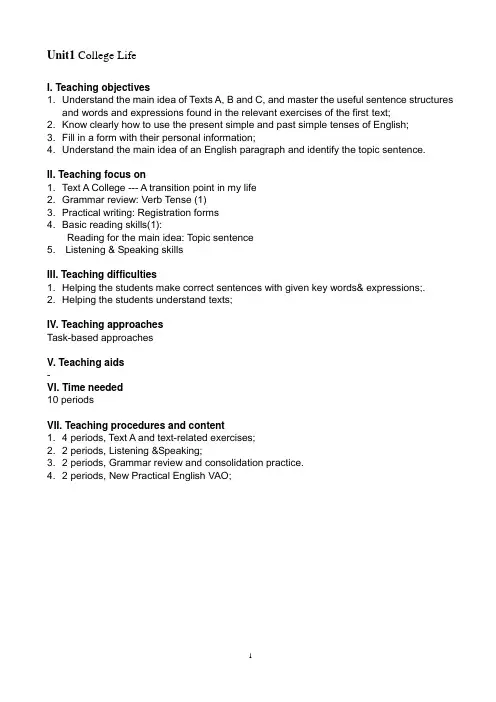
Unit1 College LifeI. Teaching objectives1. Understand the main idea of Texts A, B and C, and master the useful sentence structuresand words and expressions found in the relevant exercises of the first text;2. Know clearly how to use the present simple and past simple tenses of English;3. Fill in a form with their personal information;4. Understand the main idea of an English paragraph and identify the topic sentence.II. Teaching focus on1. Text A College --- A transition point in my life2. Grammar review: Verb Tense (1)3. Practical writing: Registration forms4. Basic reading skills(1):Reading for the main idea: Topic sentence5. Listening & Speaking skillsIII. Teaching difficulties1. Helping the students make correct sentences with given key words& expressions;.2. Helping the students understand texts;IV. Teaching approachesTask-based approachesV. Teaching aids-VI. Time needed10 periodsVII. Teaching procedures and content1. 4 periods, Text A and text-related exercises;2. 2 periods, Listening &Speaking;3. 2 periods, Grammar review and consolidation practice.4. 2 periods, New Practical English VAO;Unit 1Text A College – A Transition Point in My LifeThe First PeriodTEXT ARead the new words and expressionsArticle11. Transition: n. (instance of) changing from one state or condition to another 过渡;转变2. Title of Text A: Author Unknown: The name of this writer is not known. 佚名作者.Language Points1 Enter: vt. go or come into (a place) 进入 e.g. enter a room/ a house 进入房间/房子As soon as he entered the room, he saw his father and mother.他一进屋就看到了父母。
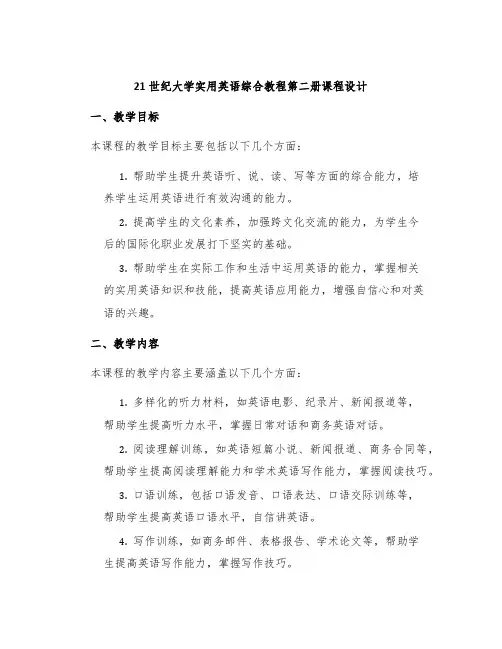
21世纪大学实用英语综合教程第二册课程设计一、教学目标本课程的教学目标主要包括以下几个方面:1.帮助学生提升英语听、说、读、写等方面的综合能力,培养学生运用英语进行有效沟通的能力。
2.提高学生的文化素养,加强跨文化交流的能力,为学生今后的国际化职业发展打下坚实的基础。
3.帮助学生在实际工作和生活中运用英语的能力,掌握相关的实用英语知识和技能,提高英语应用能力,增强自信心和对英语的兴趣。
二、教学内容本课程的教学内容主要涵盖以下几个方面:1.多样化的听力材料,如英语电影、纪录片、新闻报道等,帮助学生提高听力水平,掌握日常对话和商务英语对话。
2.阅读理解训练,如英语短篇小说、新闻报道、商务合同等,帮助学生提高阅读理解能力和学术英语写作能力,掌握阅读技巧。
3.口语训练,包括口语发音、口语表达、口语交际训练等,帮助学生提高英语口语水平,自信讲英语。
4.写作训练,如商务邮件、表格报告、学术论文等,帮助学生提高英语写作能力,掌握写作技巧。
5.翻译训练,如英汉互译、商务口译等,帮助学生掌握翻译技巧和方法,提高翻译能力。
三、教学方法针对本课程的教学目标和教学内容,我们将采用多种教学方法来帮助学生提高英语综合能力,包括:1.互动式教学法,通过提问、互动、讨论等形式,引导学生主动参与课堂,培养学生思考和创新能力。
2.探究式教学法,通过实践性任务、小组合作、角色扮演等方式,激发学生学习兴趣和学习动力,培养解决问题的能力。
3.语境式教学法,通过将课堂教学和现实情境相结合,促进学生在实际环境中学习和练习英语,培养学生的实际应用能力。
4.多媒体教学法,通过电子板书、多媒体配图和音频视频等方式,为学生打造更为生动、直观的学习环境,促进学生的学习效果。
四、教学评估本课程的教学评估主要包括两个方面:1.学生成绩评定,根据学生的听、说、读、写等能力测试成绩,对学生的英语综合能力进行评估。
2.学生反馈评价,通过教学问卷、德育评价、班会纪要等方式,收集学生对课程和教学的反馈,了解教学的效果和存在的问题。
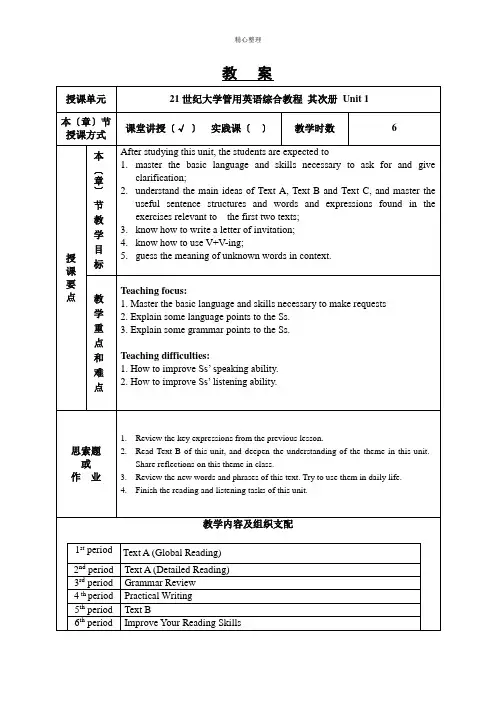
教案1st period Text A (Global Reading)1 Background InformationEnglish LanguageThe English language is the most widely spoken language in the world. It is used as either a primary or secondary language in many countries.During the 1500s, fewer than 2 million people spoke English. All of them lived in what is now Great Britain. Through the centuries, as the result of various historical events, English spread throughout the world. Today, about 400 million people speak English as their native language. Most of them live in Australia, Canada, Great Britain, Ireland, New Zealand, South Africa, and the United States.Another 100 million people living chiefly in Bangladesh, India, Pakistan, and in many African countries speak English in addition to their own language. An additional 200 million people probably know at least some English. (From the 1998 World Book Multimedia Encyclopedia)Characteristics of EnglishV ocabulary. English has a larger vocabulary than any other language. There are more than 600,000 words in the largest dictionaries of the English language.Some English words have been passed on from generation to generation as far back as scholars can trace. These words, such as woman, man, sun, hand, love, go, and eat, express basic ideas and feelings. Later, many words were borrowed from other languages, including Arabic, French, German, Greek, Italian, Latin, Russian, and Spanish. For example, algebra is from Arabic, fashion from French, piano from Italian, and canyon from Spanish.A number of words, such as doghouse and splashdown, were formed by combining other words. New words were also created by blending words. For example, motor and hotel were blended into motel. Words can be shortened to form new words, as was done with history to form story. Words called acronyms are formed by using the first letter or letters of several words. The word radar is an acronym for radio detection and ranging.Pronunciation and spelling in English sometimes seem illogical or inconsistent. Many words are spelled similarly though pronounced differently. Examples include cough, though, and through. Other words, such as blue, crew, to, too, and shoe, have similar pronunciations but are spelled differently. Many of these variations show changes that occurred during the development of English. The spelling of some words remained the same through the centuries, though their pronunciation changed.Grammar is the set of principles used to create sentences. These principles define the elements used to assemble sentences and the relationships between the elements. The elements include parts of speech and inflections.Parts of speech are the word categories of the English language. Scholars do not all agree on how to describe the parts of speech. The traditional description listseight classes: nouns, pronouns, verbs, adjectives, adverbs, prepositions, conjunctions, and interjections. The most important relationships of the parts of speech include subject and verb, verb and predicate, and modifier and the word modified.English has fewer inflections than most other European languages. An English noun has only two inflections, the plural and the possessive. Inflections are used to change the tense and number of a verb or the case of a pronoun. Inflections can change adjectives to the comparative or the superlative — for example, big, bigger, biggest.American EnglishAmerican English is a variety of the English language spoken in the United States. Although all Americans do not speak the same way, their speech has enough in common that American English can be recognized as a variety of English distinct from British English, Australian English, and other national varieties. American English has grown up with the country. It began to diverge from British English during its colonial beginnings and acquired regional differences and ethnic flavor during the settlement of the continent.Today it influences other languages and other varieties of English because it is the medium by which the attractions of American culture — its literature, motion pictures, and television programs — are transmitted to the world.Characteristics of American EnglishA. PronunciationIn broad terms, Canadian and American speakers tend to sound like one another. They also tend to sound different from a large group of English speakers who sound more British, such as those in Australia, New Zealand, and South Africa. For example, most Canadians and Americans pronounce an r sound after the vowel in words like barn, car,and farther, while speakers from the British English group do not. Also, some British English speakers drop h sounds at the beginning of words, so that he and his are pronounced as if they were spelled ee and is. The English spoken in Australia, New Zealand, and South Africa sounds more like British English than American English does because these varieties have had less time to diverge from British English. The process of separate development began later in these countries than in North America.In some cases there are differences between American English and British English in the rhythm of words. British speakers seem to leave out a syllable in words like secretary, as if it were spelled secretry, while Americans keep all the syllables. The opposite is true of other words, such as specialty, which Americans pronounce with three syllables (spe-cial-ty) while British speakers pronounce it with five syllables (spe-ci-al-i-ty). V owels and consonants may also have different pronunciations. British speakers pronounce zebra to rhyme with Debra, while American speakers make zebra rhyme with Libra. Canadian and British speakers pronounce the word schedule as if it began with an sh sound, while Americans pronounce it as if it began with an sk sound.B. WordsThe most frequently used words are shared by speakers of different varieties of English. These words include the most common nouns, the most common verbs, and most function words (such as pronouns, articles, and prepositions). The different varieties of English do, however, use different words for many words that are slightly less common —for example, British crisps for American potato chips, Australian billabong for American pond, and Canadian chesterfield for American sofa. It is even more common for the same word to exist with different meanings in different varieties of English.Corn is a general term in Britain, for which Americans use grain, while corn in American English is a specific kind of grain. The word pond in British English usually refers to an artificial body of water, whereas ponds also occur naturally in North America. British English chemist is the same as American English drugstore, and in Canada people go to the druggist. Many of the words most easily recognized as American in origin are associated with aspects of American popular culture, such as gangster or cowboy.C. SpellingAmerican English spelling differs from British English spelling largely because of one man, American lexicographer Noah Webster. In addition to his well-known An American Dictionary of the English Language (1828), Webster published The American Spelling Book (1783, with many subsequent editions), which became one of the most widely used schoolbooks in American history. Webster’s books sought to standardize spelling in the United States by promoting the use of an American language that intentionally differed from British English. The development of a specifically American variety of English mirrored the newcountry’s separate political development. Webster’s most successful changes were spellings with or instead of o ur (honor, labor for the British honour, labour); with er instead of re (center, theater for the British centre, theatre); with an s instead of a c (defense, license for the British defence, licence); with a final ck instead of que (check, mask for the British cheque, masque); and without a final k (traffic, public, now also used in British English, for the older traffick, publick). Later spelling reform created a few other differences, such as program for British programme. Canadian spelling varies between the British and American forms, more British in eastern Canada and more American in western Canada.2. Group DiscussionHave you ever had an experience in which you are misunderstood or have failed to understand others? Misunderstandings can result from the spoken form or written form of the language that you use.2nd period Text A (Detailed Reading)Words and Expressions & Difficult Sentences1) misunderstanding: n. (an example of) wrong understanding 误会,误会e.g. Her poor French often leads to misunderstandings when she visits France. misunderstand: vt. understand wrongly 误会e.g. I’m sorry, I misunderstood you.It seems that you have misunderstood what I said at the meeting.2) get on: board (a bus, a train, etc.)登上〔公共汽车、火车等〕e.g. When I got on the bus, I found all the seats were occupied.They felt worried when they realized that they had got on the wrong train.3) head for: go towards 向…走去;朝…行进e.g. The ship was heading for Britain.He headed for the bus stop.4) …he could ride to New York without paying.介词without 说明为“不、未”,其后跟动词时,须用V-ing形式。
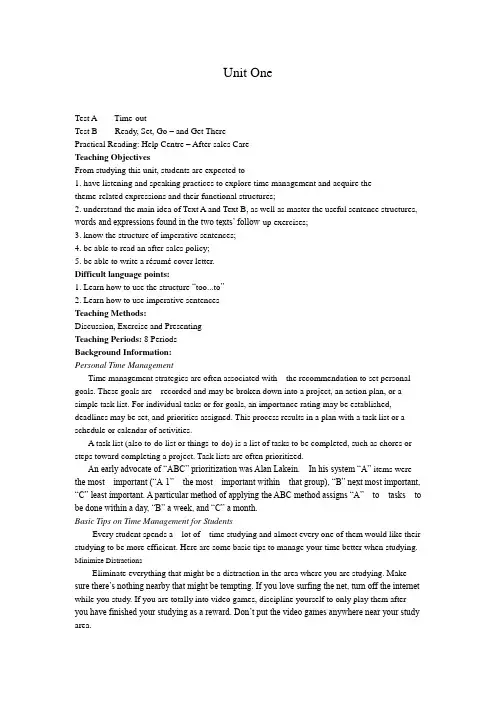
Unit OneTest A Time-outTest B Ready, Set, Go – and Get TherePractical Reading: Help Centre – After-sales CareTeaching ObjectivesFrom studying this unit, students are expected to1. have listening and speaking practices to explore time management and acquire thetheme-related expressions and their functional structures;2. understand the main idea of Text A and Text B, as well as master the useful sentence structures, words and expressions found in the two texts’ follow-up exercises;3. know the structure of imperative sentences;4. be able to read an after-sales policy;5. be able to write a résumé cover letter.Difficult language points:1. Learn how to use the structure “too...to”2.Learn how to use imperative sentencesTeaching Methods:Discussion, Exercise and PresentingTeaching Periods: 8 PeriodsBackground Information:Personal Time ManagementTime management strategies are often associated with the recommendation to set personal goals. These goals are recorded and may be broken down into a project, an action plan, or a simple task list. For individual tasks or for goals, an importance rating may be established, deadlines may be set, and priorities assigned. This process results in a plan with a task list or a schedule or calendar of activities.A task list (also to-do list or things-to-do) is a list of tasks to be completed, such as chores or steps toward completing a project. Task lists are often prioritized.An early advocate of “ABC” prioritization was Alan Lakein. In his system “A” items were the most important (“A-1” the most important within that group), “B” next most important, “C” least important. A particular method of applying the ABC method assigns “A” to tasks to be done within a day, “B” a week, and “C” a month.Basic Tips on Time Management for StudentsEvery student spends a lot of time studying and almost every one of them would like their studying to be more efficient. Here are some basic tips to manage your time better when studying. Minimize DistractionsEliminate everything that might be a distraction in the area where you are studying. Make sure there’s nothing nearby that might be tempting. If you love surfing the net, turn off the internet while you study. If you are totally into video games, discipline yourself to only play them after you have finished your studying as a reward. Don’t put the video games anywhere near your study area.Watching TV whilst studying is a very bad idea and makes your studying really ineffective. You need to minimize all di stractions and TV is a big one even if it’s just on in the background. Time of Day for StudyStudying at the same time each and every day helps. Most people find it more effective to study during the day rather than at night, because they can concentrate better. But if you are a real night owl, then you may find that your ability to concentrate at night is just fine.Total 100% Focus for at Least 40 Minutes at a TimeOne of the most important things you can do to study effectively is to focus totally on your studying for at least 40 minutes at a time. Studying for 10 minutes here and there just will not cut it. Instead of quick little snippets, make sure you get in at least 40 or 50 minutes of total focus. While you’re doing this, don’t let yourself get distracted with anything else! Just focus intensely for the entire time. When you are finished, then relax, and play a video game or watch TV to reward yourself.You also don’t want to study for too long at a time, because your brain gets fatigued an d after a while it needs a rest. 90 minutes is probably the maximum you should go before taking a 10-minute break, and usually 60 minutes is enough.教学后记:。
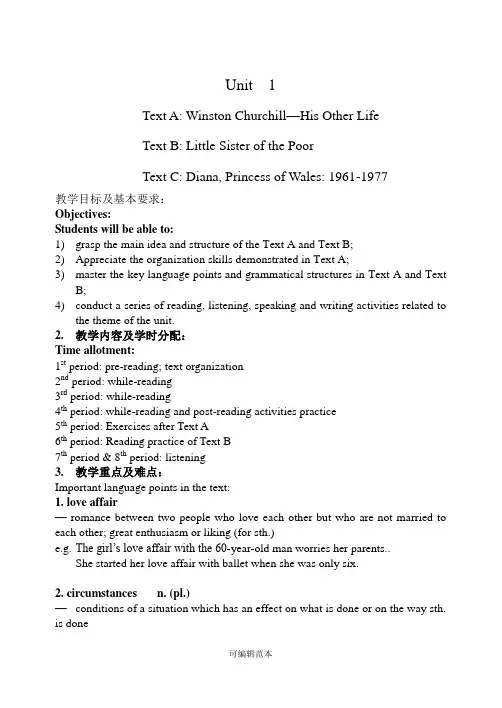
Unit 1Text A: Winston Churchill—His Other LifeText B: Little Sister of the PoorText C: Diana, Princess of Wales: 1961-1977教学目标及基本要求:Objectives:Students will be able to:1)grasp the main idea and structure of the Text A and Text B;2)Appreciate the organization skills demonstrated in Text A;3)master the key language points and grammatical structures in Text A and TextB;4)conduct a series of reading, listening, speaking and writing activities related tothe theme of the unit.2. 教学内容及学时分配:Time allotment:1st period: pre-reading; text organization2nd period: while-reading3rd period: while-reading4th period: while-reading and post-reading activities practice5th period: Exercises after Text A6th period: Reading practice of Text B7th period & 8th period: listening3. 教学重点及难点:Important language points in the text:1. love affair— romance between two people who love each other but who are not married to each other; great enthusiasm or liking (for sth.)e.g. The girl’s love affair with the 60-year-old man worries her parents..She started her love affair with ballet when she was only six.2. circumstances n. (pl.)—conditions of a situation which has an effect on what is done or on the way sth. is donee.g. In some circumstances it may be necessary for the manager to come here in person.Even under the most favorable circumstances this is not easy.3. mission n.—an important job sb. is sent to do in another place, esp. for a military or political purposee.g. The foreign minister’s missi on to Paris is to negotiate a cease-fire.It is his sole mission to expand the company’s business abroad.4.price n.—what must be given, done, or undergone to obtain or compensate for sth.e.g. We paid a heavy price for the victory, for we lost 10,000 soldiers.Translate : This is a small price to pay for independence.Key: 这是为独立付出的小小代价。
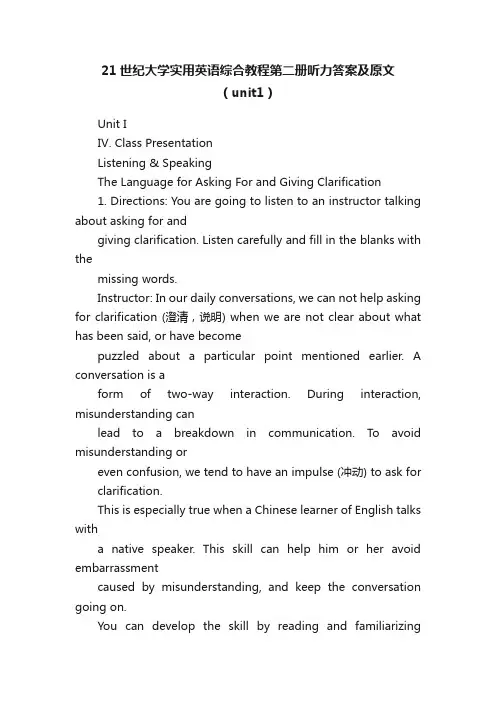
21世纪大学实用英语综合教程第二册听力答案及原文(unit1)Unit IⅣ. Class PresentationListening & SpeakingThe Language for Asking For and Giving Clarification1. Directions: You are going to listen to an instructor talking about asking for andgiving clarification. Listen carefully and fill in the blanks with themissing words.Instructor: In our daily conversations, we can not help asking for clarification (澄清,说明) when we are not clear about what has been said, or have becomepuzzled about a particular point mentioned earlier. A conversation is aform of two-way interaction. During interaction, misunderstanding canlead to a breakdown in communication. To avoid misunderstanding oreven confusion, we tend to have an impulse (冲动) to ask for clarification.This is especially true when a Chinese learner of English talks witha native speaker. This skill can help him or her avoid embarrassmentcaused by misunderstanding, and keep the conversation going on.You can develop the skill by reading and familiarizingyourselves with the language for asking for and giving clarification:—I’m sorry, I don’t quite understand what you mean by market economy.—I’m sorry, could you (possibly) explain what you mean by globalization?—I don’t understand what you mean by black lie.—What (exactly) do you mean by sick humor?And the language for giving clarification:—(Well,) what I’m trying to say is (that) + SENTENCE.—(Well,) the point I’m trying to make is (that) + SEN TENCE.—(Well,) I think what I mean is (that) + SENTENCE.—What I mean is (that) + SENTENCE.—What I’m saying is (that) + SENTENCE.—All I’m trying to say is (that) + SENTENCE.2. Now come up with a particular subject on which you voice your opinion or attitude, and expect others to ask for clarification about something that might be unclear to them. Try to use the language you have just learned in Exercise 1. Asking For and Giving Clarification1) Directions: Before you listen to the first conversation, read the following wordsand expressions which may be new to you.available 有空的innocent 无害的fib 小谎Listen to the following conversation twice and fill in the blanks with the missing words.Wang Ying: Are you going to the party tonight, Tom? They told me it was going to be fun.Tom Chang: I know, but I don’t think I’m available tonight. Are you?Wang Ying: Well…it depends.Tom Chang: I’ll tell them a little white lie.Wang Ying: Tell them what? What’s that?Tom Chang: I said: “I will tell them a little white lie.”Wang Ying: I don’t understand what you mean by white lie.Tom Chang: Oh, it is an innocent social fib or excuse.Wang Ying: Oh, I’ve got it now!Tom Chang: Sometimes we have to do it in our daily lives.Wang Ying: So what’s your little white lie?Tom Chang: Well, what would you say?Now listen to the conversation and answer the following questions1. Who won’t be able to attend the party tonight?Tom Chang.2. Is Wang Ying going to the party?It depends.3. What will Tom Chang tell them?He’ll tell th em a little white lie.4. What is a white lie according to Rom Chang?It’s an innocent social fib or excuse.35. What’s their little white lie?Not mentioned.2) Directions: Before you listen to the second conversation, read the following wordwhich may be new to you.hearing problems 听觉疾病hearing aid 助听器device 装置will 遗嘱Listen to the following conversation twice, and then complete the passage according to the conversation you have just heard.There was an elderly gentleman who had had serious hearing problems for years. He went to the doctor who was able to have him fitted for a set of hearing aids that allowed the man to hear 100%.The old fellow went back in a month to the doctor and the doctor said, “Your hearing is perfect. Your family must be really pleased that you can hear again.”To this the gentleman replied, “Oh, I haven’t told my family yet. I just sit around and listen to conversations. I’ve changed my will three times!”Now listen to the conversation again, and complete the form as the speaker recounts it. After that, act it out in class.Doctor: What brought you here?Gentleman: What did you say? Would you speak louder please?Doctor: What is bothering you today? Do you have any pain?Gentleman: No. I’ve been having serious hearing problems for years. I can’t hear people well. That’s why I’m here.Doctor: I suggest you wear a hearing aid.Gentleman: What do you mean by hearing aid? What’s that?Doctor: It’s a device that allows you to hear 100%.One month later the elderly gentleman comes to see the doctor again. Doctor: Good. Your hearing is perfect. Your family must be pleased that you can hear again.Gentleman: Oh, I haven’t told my family yet. I just sit around and listen to the conversations.Doctor: Why?Gentleman: You know what? I’ve ch anged my will three times!4. Try to figure out something that may elicit ( 引出) questions, write it down onthe chalkboard and expect others to ask for its clarification. Get ready to clarify.In your conversations, try to use the language you learned in Exercise 1.5. Directions: Listen to the following people speaking and decide what they aretalking about.1. M: This room is so crowded. I can hardly hear or see a thing.W: I don’t understand why they didn’t have this lecture in a bigger room, do you?Q: Who are they talking about?a. A lecture.b. A room.c. An instructor.d. A movie2. M: How are we going to get home? It’s so late the buses and subways have allstopped running.W: It looks as though we have no choice but to call a taxi.Q: What are they talking about?a. How to get home.b. Why the buses stopped running.c. When a taxi will come.d. Where to spend the night.3. W: Jack, have you finished your research paper foreconomies?M: Not yet, I always seem to put things off until the last minute.Q: What are they talking about?a. A scientific experiment.b. A college course.c. A time schedule.d. A research paper.4. W: Tim missed the deadline for the assignment again.M: He’s got to adjust his study habits in order to survive the university.Q: What are they talking about?a. Tim’s excellent performance.b. Tim’s assignment.c. Tim’s study habit.d. Tim’s graduation day.5. W: Watching the news on TV is a good way to learn English.M: It’s especially helpful when you check out the same information in the newspaper.Q: What are they talking about?a. How to learn English.b. How to get informed.c. How to compare TV and newspaper.d. How to get a job.6. Directions: Listen to the following five short dialogues and choose theappropriate answers.1. W: I can’t get through to this number.M: You must first dial 1.Q: What can we learn from this conversation?A) The post office is closed.B) A department store is having a sale.C) They are discussing a math contest.D) The woman is making a telephone call.2. W: Are there any dogs around?M: No, they’re not allowed in this community.Q: What does the man mean?A) No dogs are allowed in the area.B) Unfortunately, they don’t have any dogs.C) It’s good to have a dog around the house.D) The law is too complicated to understand.3. M: This one is much cheaper.W: But it may not last as long.Q: What does the woman imply?A) This is the last one. B) The longer style is better.C) It might not be of good quality.D) You should buy cheaper things.4. M: Did you ever get in touch with your friend?W: No, when I called, all I got was a recorded message. Q: What did the woman do?A) She arranged to meet her friend later.B) She fixed her friend’s tape recorder.C) She tried to telephone her friend.D) She went t o her friend’s house.5. W: Is it possible to see the apartment before we rent it? M: Sure, it’s vacant.Q: What does the man mean?A) It’s a beautiful place. B) No one lives there now.C) You can see it after your vacation.D) You had better make an appointment.7. Directions: Listen to the following short story twice. Listen carefully and decidewhether the statements are true (T) or false (F) according to thestory you have heard.blonde 金发碧眼的白种女人gallon 加仑(液量单位)bathtub 浴缸pasteurize Pasteur 用巴氏法消毒chest 胸腔A blonde heard that milk baths make you beautiful. So she left a note for her milkman to leave 15 gallons of milk.When the milkman read the note, he felt there must be a mistake. He thought she probably meant 1.5 gallons, so he knocked on the door to clarify the point.The blonde came to the door and the milkman said, “I found your note to leave 15 gallons of milk. Did you mean 15 gallons or 1.5 gallons?”The blonde said, “I want 15 gallons. I’m going to fill my bathtub with milk and take a milk bath.”The milkman asked, “Pasteurized?”The blonde said, “No, just up to my chest.”F 1. The blonde was beautiful because she took a milk bath every day.T 2. A bath took 15 gallons of milk.T 3. The milkman doubted that the blonde could drink 15 gallons of milk.F 4. The blonde corrected her mistake.F 5. The blonde said that it would be wonderful if the milk was pasteurized.8. Directions: Listen to the following talk and fill in the blanks with the missingwords. The talk is given twice.Two doctors were in a hospital hallway one day complaining about Nurse Nancy. “She’s incredibly mixed-up (糊涂),”said one doctor. “She does everything absolutely backwards (背道而驰). Just last week, I told her to give a patient 2 milligrams (毫克) of morphine (吗啡) every 10 hours. She gave him 10 milligrams every 2 hours. He damn near (几乎) died on (因为) us!”The second doctor said, “That’s nothing. Earlier this week,I told her to givea patient an enema (灌肠剂) every 24 hours. She tried to give him 24 enemas inone hour! The guy damn near exploded!”Suddenly, they heard a blood-curdling scream (令人毛骨悚然的尖叫声) from down the hall..“Oh my God!”said the first doctor, “I just realize I told Nurse Nancy to prick (刺) Mr. Smith’s boil (疖子)!”9. Directions: Listen to the talk again and then answer the following questionsorally.1. What were the two doctors talking about?They were talking about Nurse Nancy.2. Why did they say that Nurse Nancy was so mixed up?Because she did everything absolutely backwards.3. Can you give any examples to prove this?①One doctor told her to give a patient 2 milligrams of morphineevery 10 hours. She gave him 10 milligrams every 2 hours.②The other doctor told her to give a patient an enema every24 hours.She tried to give him 24 enemas in one hour.4. What did they hear all of a sudden while talking?They heard a blood-curdling scream from down the hall.5. What was Nurse Nancy most probably doing then.She was prinking a patient’s boil.10. Directions: Have a discussion on the topic given below.Life would be meaningless without misunderstandings.。
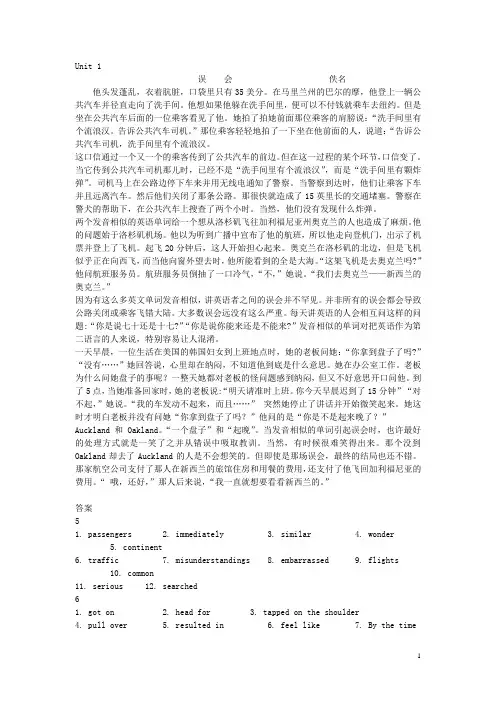
Unit 1误会佚名他头发蓬乱,衣着肮脏,口袋里只有35美分。
在马里兰州的巴尔的摩,他登上一辆公共汽车并径直走向了洗手间。
他想如果他躲在洗手间里,便可以不付钱就乘车去纽约。
但是坐在公共汽车后面的一位乘客看见了他。
她拍了拍她前面那位乘客的肩膀说:“洗手间里有个流浪汉。
告诉公共汽车司机。
”那位乘客轻轻地拍了一下坐在他前面的人,说道:“告诉公共汽车司机,洗手间里有个流浪汉。
这口信通过一个又一个的乘客传到了公共汽车的前边。
但在这一过程的某个环节,口信变了。
当它传到公共汽车司机那儿时,已经不是“洗手间里有个流浪汉”,而是“洗手间里有颗炸弹”。
司机马上在公路边停下车来并用无线电通知了警察。
当警察到达时,他们让乘客下车并且远离汽车。
然后他们关闭了那条公路。
那很快就造成了15英里长的交通堵塞。
警察在警犬的帮助下,在公共汽车上搜查了两个小时。
当然,他们没有发现什么炸弹。
两个发音相似的英语单词给一个想从洛杉矶飞往加利福尼亚州奥克兰的人也造成了麻烦。
他的问题始于洛杉矶机场。
他以为听到广播中宣布了他的航班,所以他走向登机门,出示了机票并登上了飞机。
起飞20分钟后,这人开始担心起来。
奥克兰在洛杉矶的北边,但是飞机似乎正在向西飞,而当他向窗外望去时,他所能看到的全是大海。
“这架飞机是去奥克兰吗?”他问航班服务员。
航班服务员倒抽了一口冷气,“不,”她说。
“我们去奥克兰——新西兰的奥克兰。
”因为有这么多英文单词发音相似,讲英语者之间的误会并不罕见。
并非所有的误会都会导致公路关闭或乘客飞错大陆。
大多数误会远没有这么严重。
每天讲英语的人会相互问这样的问题:“你是说七十还是十七?”“你是说你能来还是不能来?”发音相似的单词对把英语作为第二语言的人来说,特别容易让人混淆。
一天早晨,一位生活在美国的韩国妇女到上班地点时,她的老板问她:“你拿到盘子了吗?”“没有……”她回答说,心里却在纳闷,不知道他到底是什么意思。
她在办公室工作。
老板为什么问她盘子的事呢?一整天她都对老板的怪问题感到纳闷,但又不好意思开口问他。
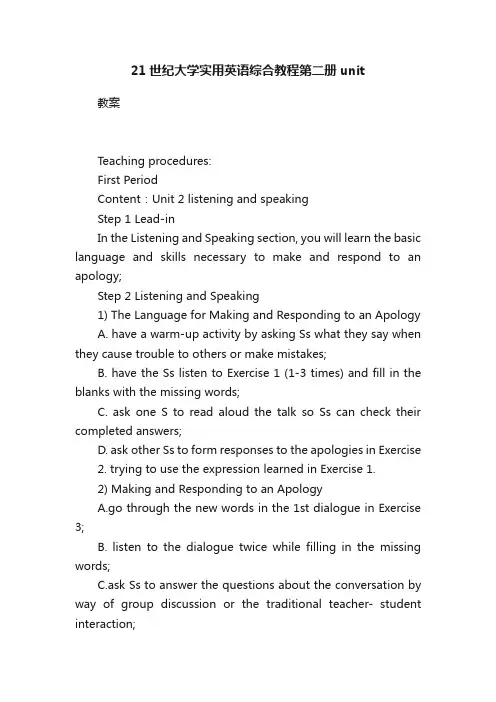
21世纪大学实用英语综合教程第二册unit 教案Teaching procedures:First PeriodContent:Unit 2 listening and speakingStep 1 Lead-inIn the Listening and Speaking section, you will learn the basic language and skills necessary to make and respond to an apology;Step 2 Listening and Speaking1) The Language for Making and Responding to an ApologyA. have a warm-up activity by asking Ss what they say when they cause trouble to others or make mistakes;B. have the Ss listen to Exercise 1 (1-3 times) and fill in the blanks with the missing words;C. ask one S to read aloud the talk so Ss can check their completed answers;D. ask other Ss to form responses to the apologies in Exercise2. trying to use the expression learned in Exercise 1.2) Making and Responding to an ApologyA.go through the new words in the 1st dialogue in Exercise 3;B. listen to the dialogue twice while filling in the missing words;C.ask Ss to answer the questions about the conversation by way of group discussion or the traditional teacher- student interaction;D.have them look for the language used to make and respond to an apology;E. Ss can role-play the dialogue;F. do the same with the second dialogueStep 3 Ask Ss to study the structures presented in Exercise 4, and create situations for dialogues in which Ss blame someone for his/her mistake or fault and expect them to make both apologies and excuses with the help of the language they have picked up in Exercise 1 and expressions from Exercise 4.Step 4 Listening PracticeA.Listen to the following people speaking and decide what they are talking about. (Each one will be given twice.)B Listen to the following five short dialogues and choose the appropriate answers.(Each one will be given twice.)C.Listen to the following short story twice. Listen carefullyand decide whether the statements are true (T) or false (F) according to the story you have heard.D.Listen to the following talk and fill in the blanks with the missing words. (The talk is given twice.)E. Listen to the talk again and then answer the following questions orally.Answers to the listening practice5. C A D A B6. C A B D C7. T T F F T8. in a loud voice particularly interesting in the same room in curing them left alone a talk suffering from a delusion who are youStep 6 SummaryThere’re many ways of making an apology:—Excuse me for my interrupting you.—I’m really sorry for being late.—I’m terribly sorry to step on you.—I’ m awfully sorry (that) I have forgetten your na me.— I apologize for what I have said.—I’m afraid I seem to have forgetten your birthday.— I owe you an apology for the delay.—I’m sorry. I didn’t mean to hurt your felling.— It was really quite unintentional.— I hope you excuse me.There are also many ways of responding to an apology: —That’s (quite) all right.—These things happen; it can’t be helped.—I quite understand. Please don’t worry.— (Oh well.) Not to worry.—No problem. Let’s forget it.Step 7 Homework assignment1. Form a dialogue with your classmates.2. preview the new lesson.Second PeriodContent:Unit 2 Text AStep1 Lead-in1. Have you ever been mistaken for someone else? Or do you know someone who has been mistaken for another person? Please share your story with your classmates.2. Now imagine you have the same name as the mayor of your city and look like him too. What might happen when you go to a hotel asking for a room and are told that the rooms are all booked?Step 2 Ask Ss to read the following passage and see whathappened to Mark Twain when he tried to get a train ticket.Step 3 Introduce the Background InformationMark Twain (1835-1910)Mark Twain was the pen name of Samuel Langhorne Clemens, one of the major authors of American fiction. Twain is also considered th e greatest humorist in American literature. Twain’s varied works include novels, travel narratives, short stories, sketches, and essays. His writings about the Mississippi River, such as The Adventures of Tom Sawyer, Life on the Mississippi, and Adventures of Huckleberry Finn, have been especially popular among modern readers. (From the 1998 World Book Encyclopedia)7-Eleven7-Eleven, Inc. is the world’s largest operator, franchiser and licensor of convenience stores with more than 24,000 units worldwide. Founded in Dallas, Texas in 1927 as an ice company, 7-Eleven pioneered the convenience store concept during its early years when its ice docks began selling milk, bread and eggs as a convenience to customers.The name 7-Eleven originated in 1946 when the stores were open from 7 a.m. until 11 . Today, offering customers 24hour convenience, seven days a week is the cornerstone of 7-Eleven’s business. Approximately 5,800 7-Eleven and other convenience stores are operated and franchised in the United States and Canada.Step 4 Listen to the whole text and answer some questions about the text.Step 5 Deal with some languages points1) I was to take the sleeper train there: I planned to take the sleeper train there.我计划在那儿搭乘卧车。
Unit 1误会佚名他头发蓬乱,衣着肮脏,口袋里只有35美分。
在马里兰州的巴尔的摩,他登上一辆公共汽车并径直走向了洗手间。
他想如果他躲在洗手间里,便可以不付钱就乘车去纽约。
但是坐在公共汽车后面的一位乘客看见了他。
她拍了拍她前面那位乘客的肩膀说:“洗手间里有个流浪汉。
告诉公共汽车司机。
”那位乘客轻轻地拍了一下坐在他前面的人,说道:“告诉公共汽车司机,洗手间里有个流浪汉。
这口信通过一个又一个的乘客传到了公共汽车的前边。
但在这一过程的某个环节,口信变了。
当它传到公共汽车司机那儿时,已经不是“洗手间里有个流浪汉”,而是“洗手间里有颗炸弹”。
司机马上在公路边停下车来并用无线电通知了警察。
当警察到达时,他们让乘客下车并且远离汽车。
然后他们关闭了那条公路。
那很快就造成了15英里长的交通堵塞。
警察在警犬的帮助下,在公共汽车上搜查了两个小时。
当然,他们没有发现什么炸弹。
两个发音相似的英语单词给一个想从洛杉矶飞往加利福尼亚州奥克兰的人也造成了麻烦。
他的问题始于洛杉矶机场。
他以为听到广播中宣布了他的航班,所以他走向登机门,出示了机票并登上了飞机。
起飞20分钟后,这人开始担心起来。
奥克兰在洛杉矶的北边,但是飞机似乎正在向西飞,而当他向窗外望去时,他所能看到的全是大海。
“这架飞机是去奥克兰吗?”他问航班服务员。
航班服务员倒抽了一口冷气,“不,”她说。
“我们去奥克兰——新西兰的奥克兰。
”因为有这么多英文单词发音相似,讲英语者之间的误会并不罕见。
并非所有的误会都会导致公路关闭或乘客飞错大陆。
大多数误会远没有这么严重。
每天讲英语的人会相互问这样的问题:“你是说七十还是十七?”“你是说你能来还是不能来?”发音相似的单词对把英语作为第二语言的人来说,特别容易让人混淆。
教案1st period Text A (Global Reading)1 Background InformationEnglish LanguageThe English language is the most widely spoken language in the world. It is used as either a primary or secondary language in manycountries.During the 1500s, fewer than 2 million people spoke English. All of them lived in what is now Great Britain. Through the centuries, as the result of various historical events, English spread throughout the world. Today, about 400 million people speak English as their native language. Most of them live in Australia, Canada, Great Britain, Ireland, New Zealand, South Africa, and the United States.Another 100 million people living chiefly in Bangladesh, India, Pakistan, and in many African countries speak English in addition to their own language. An additional 200 million people probably know at least some English. (From the 1998 World Book Multimedia Encyclopedia)Characteristics of EnglishVocabulary. English has a larger vocabulary than any other language. There are more than 600,000 words in the largest dictionaries of the English language.Some English words have been passed on from generation to generation as far back as scholars can trace. These words, such as woman, man, sun, hand, love, go, and eat, express basic ideas and feelings. Later, many words were borrowed from other languages, including Arabic, French, German, Greek, Italian, Latin, Russian, and Spanish. For example, algebra is from Arabic, fashion from French,piano from Italian, and canyon from Spanish.A number of words, such as doghouse and splashdown, were formed by combining other words. New words were also created by blending words. For example, motor and hotel were blended into motel. Words can be shortened to form new words, as was done with history to form story. Words called acronyms are formed by using the first letter or letters of several words. The word radar is an acronym for radio detection and ranging.Pronunciation and spelling in English sometimes seem illogical or inconsistent. Many words are spelled similarly though pronounced differently. Examples include cough, though, and through. Other words, such as blue, crew, to, too, and shoe, have similar pronunciations but are spelled differently. Many of these variations show changes that occurred during the development of English. The spelling of some words remained the same through the centuries, though their pronunciation changed.Grammar is the set of principles used to create sentences. These principles define the elements used to assemble sentences and the relationships between the elements. The elements include parts of speech and inflections.Parts of speech are the word categories of the English language. Scholars do not all agree on how to describe the parts of speech. Thetraditional description lists eight classes: nouns, pronouns, verbs, adjectives, adverbs, prepositions, conjunctions, and interjections. The most important relationships of the parts of speech include subject and verb, verb and predicate, and modifier and the word modified. English has fewer inflections than most other European languages. An English noun has only two inflections, the plural and the possessive. Inflections are used to change the tense and number of a verb or the case of a pronoun. Inflections can change adjectives to the comparative or the superlative —for example, big, bigger, biggest.American EnglishAmerican English is a variety of the English language spoken in the United States. Although all Americans do not speak the same way, their speech has enough in common that American English can be recognized as a variety of English distinct from British English, Australian English, and other national varieties. American English has grown up with the country. It began to diverge from British English during its colonial beginnings and acquired regional differences and ethnic flavor during the settlement of the continent.Today it influences other languages and other varieties of English because it is the medium by which the attractions of American culture —its literature, motion pictures, and television programs —aretransmitted to the world.Characteristics of American EnglishA. PronunciationIn broad terms, Canadian and American speakers tend to sound like one another. They also tend to sound different from a large group of English speakers who sound more British, such as those in Australia, New Zealand, and South Africa. For example, most Canadians and Americans pronounce an r sound after the vowel in words like barn, car,and farther, while speakers from the British English group do not. Also, some British English speakers drop h sounds at the beginning of words, so that he and his are pronounced as if they were spelled ee and is. The English spoken in Australia, New Zealand, and South Africa sounds more like British English than American English does because these varieties have had less time to diverge from British English. The process of separate development began later in these countries than in North America.In some cases there are differences between American English and British English in the rhythm of words. British speakers seem to leave out a syllable in words like secretary, as if it were spelled secretry, while Americans keep all the syllables. The opposite is true of other words, such as specialty, which Americans pronounce with three syllables (spe-cial-ty) while British speakers pronounce it with five syllables (spe-ci-al-i-ty). Vowels and consonants may also have differentpronunciations. British speakers pronounce zebra to rhyme with Debra, while American speakers make zebra rhyme with Libra. Canadian and British speakers pronounce the word schedule as if it began with an sh sound, while Americans pronounce it as if it began with an sk sound.B. WordsThe most frequently used words are shared by speakers of different varieties of English. These words include the most common nouns, the most common verbs, and most function words (such as pronouns, articles, and prepositions). The different varieties of English do, however, use different words for many words that are slightly less common —for example, British crisps for American potato chips, Australian billabong for American pond, and Canadian chesterfield for American sofa. It is even more common for the same word to exist with different meanings in different varieties of English.Corn is a general term in Britain, for which Americans use grain, while corn in American English is a specific kind of grain. The word pond in British English usually refers to an artificial body of water, whereas ponds also occur naturally in North America. British English chemist is the same as American English drugstore, and in Canada people go to the druggist. Many of the words most easily recognized as American in origin are associated with aspects of American popular culture, such as gangster or cowboy.C. SpellingAmerican English spelling differs from British English spelling largely because of one man, American lexicographer Noah Webster. In addition to his well-known An American Dictionary of the English Language (1828), Webster published The American Spelling Book (1783, with many subsequent editions), which became one of the most widely used schoolbooks in American history. Webster’s books sought to standardize spelling in the United States by promoting the use of an American language that intentionally differed from British English. The development of a specifically American variety of English mirrored the newcountry’s separate political development. Webster’s most successful changes were spellings with or instead of our (honor, labor for the British honour, labour); with er instead of re (center, theater for the British centre, theatre); with an s instead of a c (defense, license for the British defence, licence); with a final ck instead of que (check, mask for the British cheque, masque); and without a final k (traffic, public, now also used in British English, for the older traffick, publick). Later spelling reform created a few other differences, such as program for British programme. Canadian spelling varies between the British and American forms, more British in eastern Canada and more American in western Canada.2. Group DiscussionHave you ever had an experience in which you are misunderstood or have failed to understand others? Misunderstandings can result from the spoken form or written form of the language that you use.2nd period Text A (Detailed Reading)Words and Expressions & Difficult Sentences1) misunderstanding: n. (an example of) wrong understanding 误解,误会e.g. Her poor French often leads to misunderstandings when she visits France.misunderstand: vt. understand wrongly 误解e.g. I’m sorry, I misunderstood you.It seems that you have misunderstood what I said at the meeting.2) get on: board (a bus, a train, etc.)登上(公共汽车、火车等)e.g. When I got on the bus, I found all the seats were occupied.They felt worried when they realized that they had got on the wrongtrain.3) head for: go towards 向…走去;朝…行进e.g. The ship was heading for Britain.He headed for the bus stop.4) …he could ride to New York without paying.介词without 解释为“不、未”,其后跟动词时,须用V-ing形式。